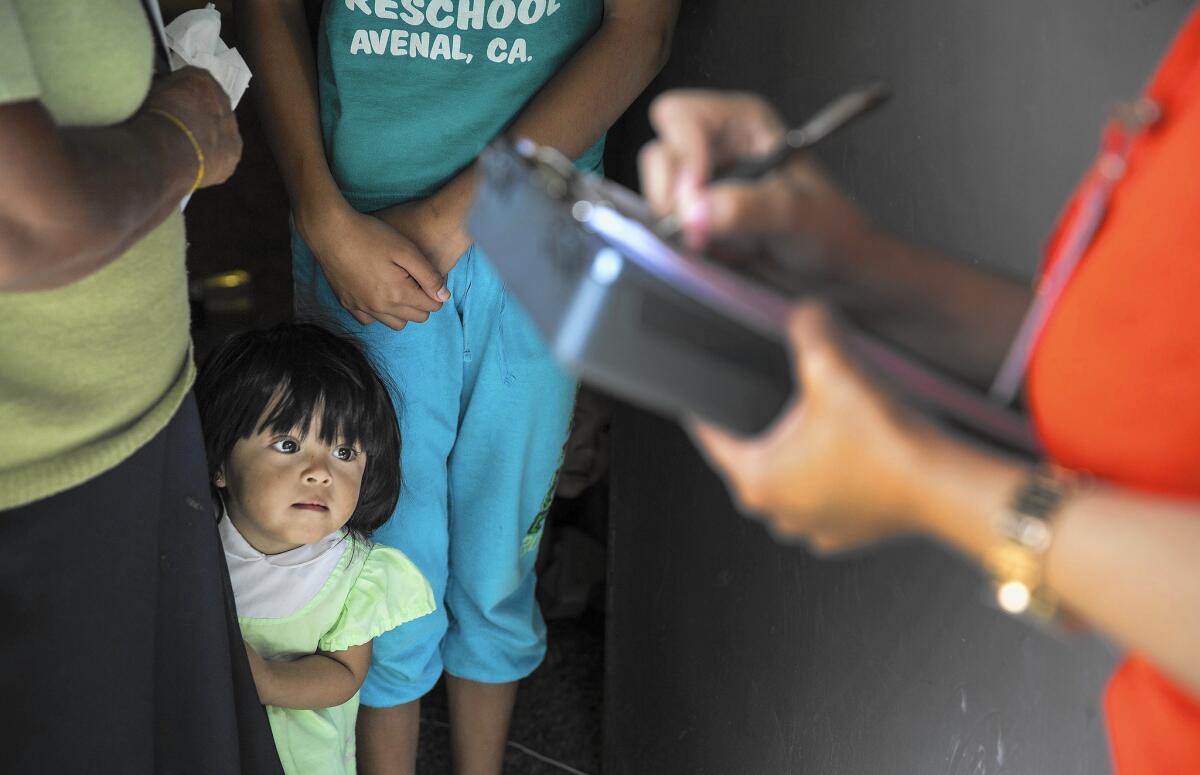This judge says toddlers can defend themselves in immigration court

A federal immigration judge believes migrant toddlers can defend themselves in court, according to a deposition in a court case brought by advocates seeking government-appointed attorneys for the youths.
“I’ve taught immigration law literally to 3-year-olds and 4-year-olds. It takes a lot of time. It takes a lot of patience,” Judge Jack Weil said. “They get it. It’s not the most efficient, but it can be done.”
The startling statement from Weil, a Virginia-based judge responsible for training his peers, comes at a time when the number of young unaccompanied migrants crossing the southern border has sharply risen.
In immigration court, there is no guarantee of counsel for adults or children. Advocates for immigrants have long argued that a person’s ability to make informed decisions — and their chances of being allowed to stay in the U.S. — are enhanced if an attorney represents them.
Last month, Senate Minority Leader Harry Reid of Nevada and other Democrats introduced legislation that would require the government to appoint attorneys for children in immigration court who crossed the border alone or were victims of abuse, torture and other violence.
A total of 20,455 unaccompanied youths were caught at the border from October through the end of January, more than double the number during the same period the previous year, which also saw an increase over the year before that, according to U.S. Customs and Border Protection. Youths started streaming in large numbers across the border illegally during the summer of 2014.
In July of that year, the American Civil Liberties Union and several other groups filed a class-action lawsuit on behalf of youths in Seattle federal court seeking court-appointed counsel, including a 17-year-old Guatemalan boy who joined his father in Los Angeles after fleeing gang violence, a common motive for Central American migrants.
The lawsuit alleged that immigration courts, the Justice Department that runs them and other federal agencies violated the youths’ due process and right to a “full and fair hearing” under the Immigration and Nationality Act.
On Friday, the ACLU posted a transcript of the deposition in that case in which Weil asserted that toddlers can represent themselves in his court.
“Are you aware of any experts in child psychology or comparable experts who agree with the assessment that 3- and 4-year-olds can be taught immigration law?” Ahilan Arulanantham, a Los Angeles-based deputy legal director of the ACLU of Southern California, asked Weil during the deposition in October.
“I haven’t read any studies one way or another,” Weil said, according to the transcript.
“What about like a 1-year-old?” Arulanantham said.
“I mean, I think there’s a point that there has to be communication,” Weil said.
But he later maintained: “I have trained 3-year-olds and 4-year-olds in immigration law. You can do a fair hearing.”
Weil went on to note: “It’s going to take you a lot of time. But I really think that a great alternative to terminating a case for a child who may be eligible for relief where there’s no counsel is to proceed very slowly, very carefully, and I’m going to tap every single resource I can to see if I can get the some help.”
“By help, you mean counsel?” Arulanantham said.
“Counsel allows me to be effective. They allow me to be efficient,” Weil said, but without an attorney for the child, “I can trudge on.”
He noted that “part of the training is working with very difficult respondents, whether it’s due to a mental disorder, an uncooperative person, a child. Good attorneys and good judges are used to working with difficult respondents.”
The government had offered Weil as an expert witness in the case, and submitted his deposition to the court in January to support its position that attorneys should not be mandatory for youths in immigration court.
A graduate of the University of Maryland and its law school, Weil served first as a law clerk in San Diego immigration court before rising through the ranks as an immigration judge in El Centro, Calif., and finally assistant chief immigration judge responsible for overseeing policies in the country’s 58 immigration courts. He also oversees the training of judges, court administrators, interpreters, legal technicians and law clerks.
Weil did not respond to email or calls Friday. He emailed the Washington Post to say his comments don’t “present an accurate assessment of my views on this topic” and were being “taken out of context.”
Lauren Alder Reid, a spokeswoman for the Justice Department’s Executive Office for Immigration Review, said in a statement: “The assistant chief immigration judge was speaking in a personal capacity when he made that statement.”
“The Department of Justice recognizes that immigration court proceedings are more effective and efficient when individuals are represented,” she said, and noted that the administration has urged Congress to support legal representation for unaccompanied children.
Susan Terrio, an anthropology professor at Georgetown University, interviewed dozens of unaccompanied minors as well as immigration attorneys and judges for her book published last year, “Whose Child Am I? Unaccompanied, Undocumented Children in U.S. Immigration Custody.”
All of the attorneys she interviewed received special training in immigration law before representing children in court, Terrio said.
“If a graduate of an American law school needs specialized training in order to provide competent legal representation, it strains credulity for an immigration judge to insist that he can train a young child in complicated legal concepts and procedures,” she said, “particularly when that child is from a different culture, does not speak English, does not yet read in her native language, is apprehended and held in custody after an often dangerous and traumatizing journey to the U.S., and has no government-appointed attorney or child advocate.”
All 31 of the immigration judges she interviewed supported providing legal representation for youths in immigration court, Terrio said, “because it would be more ethical and efficient.”
The ACLU lawyer who deposed Weil said he was “mystified” and “flabbergasted” by the judge’s comments — and by the department’s backtracking.
Arulanantham said Weil’s comments were “obviously not out of context. He says it repeatedly and at great length.”
As for the Obama administration, “if that’s not their position, then what is it?” Arulanantham said. “Far from it being one random judge, this is what the government in practice is doing in immigration courts around the country every day.”
He said he plans to raise the issue again at the next court hearing, set for March 24.
Twitter: @mollyhf
ALSO
Chinese woman trapped for a month in an elevator starves to death
UC Davis chancellor apologizes for controversial moonlighting activities
UFC 196 results: Diaz upsets McGregor; Tate takes title from Holm
More to Read
Sign up for Essential California
The most important California stories and recommendations in your inbox every morning.
You may occasionally receive promotional content from the Los Angeles Times.











